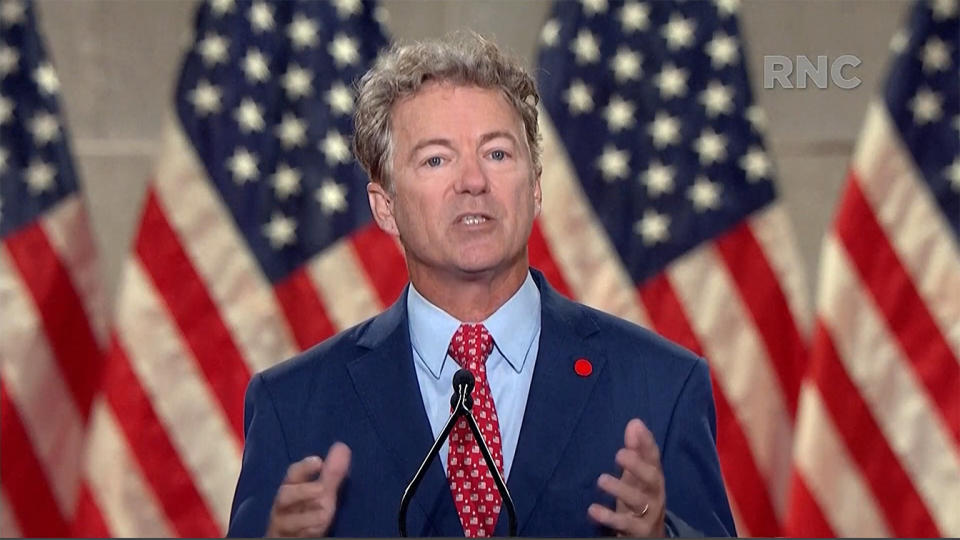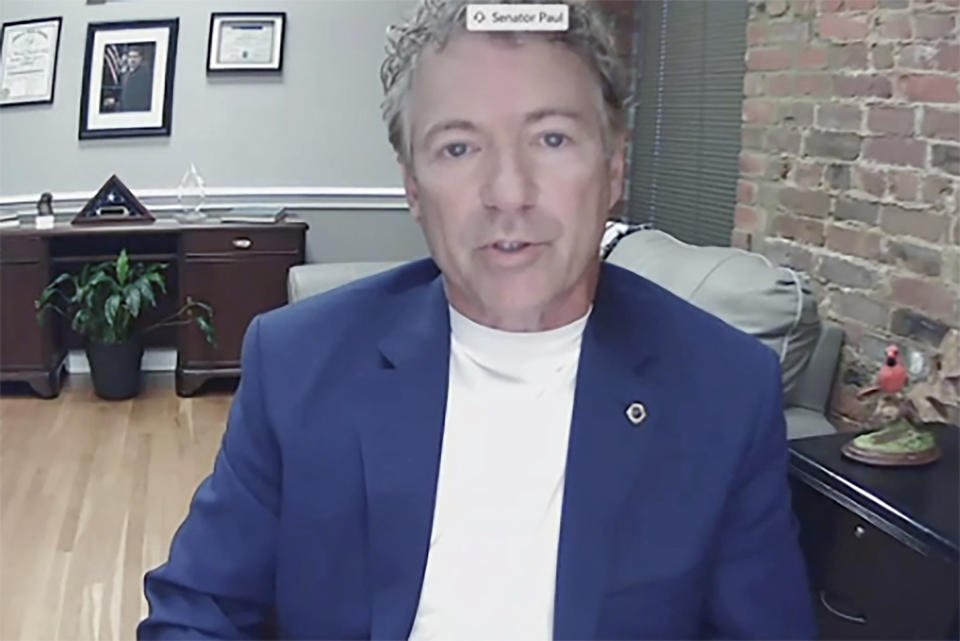Rand Paul claims Trump is the most antiwar president 'in a generation'
Sen. Rand Paul of Kentucky kicked off the second night of this year’s Republican National Convention Tuesday by insisting that President Trump — whose bellicose rhetoric often belies a reluctance to intervene in overseas conflicts — is the most antiwar commander in chief in recent U.S. history.
“President Trump is the first president in a generation to seek to end war rather than start one,” Paul claimed, downplaying the fact that Trump’s predecessor, Barack Obama, slashed the number of U.S. troops in war zones from 150,000 to 14,000, even as he increased drone strikes. “If you hate war like I hate war — if you want us to quit sending $50 billion to Afghanistan for luxury hotels and natural-gas stations ... you need to support President Trump for another term.”
Paul’s praise underscored one of the major themes of a convention that didn’t even bother to write a new party platform: how completely Trump has remade the once-hostile GOP in his own image.
That transformation is perhaps most striking in regard to Republicans’ new attitude toward the rest of the world. For viewers old enough to recall Ronald Reagan’s saber-rattling, George W. Bush’s mantra “You’re with us or against us,” or even Sen. Mitt Romney’s “Russia is our No. 1 geopolitical foe” tough talk, the sight of a Republican senator standing on stage at a Republican National Convention and celebrating a Republican president for his alleged dovishness was dizzying.
The sight of the same senator, in the next breath, accusing the Democratic nominee of being a warmonger — and echoing the left’s attacks on Biden’s establishment-friendly foreign policy record — was even more disorienting.
“Joe Biden voted for the Iraq War, which President Trump has long called the worst geopolitical mistake of our generation,” Paul said. “I fear Biden will choose war again. He supported war in Serbia, Syria and Libya. Joe Biden will continue to spill our blood and treasure. President Trump will bring our heroes home.”

Yet Paul’s attempt to frame Trump as 2020’s antiwar candidate reflects a deeper political reality. After decades of debacles in Iraq and Afghanistan, even Republican voters are weary of war — a weariness that has allowed a party that prized hawkishness for much of its history to rapidly adopt a Trumpian worldview that vacillates between punishing allies, fawning over foes and, in its more coherent moments, hewing to something like the “America First” non-interventionism that both Paul and his father, the former Texas congressman and three-time presidential candidate Rep. Ron Paul, have advocated for years.
“We must not continue to leave our blood and treasure in Middle East quagmires,” Paul said. “I’m supporting President Trump because he believes, as I do, that a strong America cannot fight endless wars.”
Since arriving in the U.S. Senate in 2011 as part of that cycle’s tea party wave, Paul has carved out a niche for himself as one of Washington, D.C.’s least orthodox conservatives — not as doggedly libertarian as his dad, but dogged enough to clash frequently with mainstream Republicans over issues of civil liberties, fiscal responsibility, criminal justice and national security.
At first, Paul was not a fan of Trump. In 2011, Trump said that Ron Paul had no chance of becoming president. The younger Paul immediately shot back on CNN: "I think his chances are less than my father's.”
By 2015, both Rand Paul and Trump were running for the Republican nomination themselves. Paul did not mince words when describing his celebrity opponent. He called Trump a "fake conservative" and “bully,” and after the first primary debate, called his "all blather, non sequitur and self-aggrandizing bombast." A few months later, he called him a "delusional narcissist and an orange-faced windbag."

“Do we want someone with that kind of character, that kind of careless language, to be negotiating with [Russian President Vladimir] Putin, to be negotiating with Iran?" Paul asked.
Apparently the answer was yes, at least for a plurality of GOP primary voters and just enough residents of Michigan, Wisconsin and Pennsylvania to tip the Electoral College.
Once Trump won the presidency, it didn’t take long for Paul to soften his stance.
“I don’t always agree with him,” Paul said Monday. “But our occasional policy differences are far outweighed by our significant agreements.”
The Kentucky senator still takes prickly, self-avowedly “principled” stands on major issues: blocking the GOP’s initial effort to repeal Obamacare because it didn’t dismantle the law thoroughly enough; blasting costly coronavirus relief packages because "the majority of Republicans are now no different than socialist Democrats when it comes to debt”; opposing recent anti-lynching legislation, despite the fact that all 99 of his Senate colleagues support it.
“This bill would cheapen the meaning of lynching by defining it so broadly as to include a minor bruise or abrasion,” Paul explained. “Our national history of racial terrorism demands more seriousness of us than that.”
Yet Paul has also recognized the opportunity in Trump’s opportunism — his tendency not to let anything as pesky as GOP dogma get in the way of winning the news cycle. And so Paul dismissed the impeachment proceedings against Trump as a “witch hunt,” a “charade” and “partisan abuse of power,” completing a crossword puzzle during the early arguments and pushing to expose the identity of the whistleblower whose complaint about Ukraine triggered the investigation.
“The big picture is that we should be engaged with Russia," Paul insisted on CNN. "It would be a mistake not to have open lines of communication with them."
"Thank you @RandPaul, you really get it!" Trump tweeted.
In return, Paul’s once-outré approach to foreign policy — avoid militarism in Middle Eastern hotspots such as Syria and Iran; engage with leaders from troublesome countries such as Russia and North Korea — has informed Trump’s own, even if the president has both withdrawn troops from Syria and fired missiles at Syria.
During his remarks, Paul, a longtime proponent of criminal-justice reform, also commended Trump for signing the recent bipartisan First Step Act, which introduced modest measures to alter the federal criminal justice system and ease punitive prison sentences at the federal level.
In a sign, however, that the GOP is still far more Trump’s party than Paul’s, the Kentucky senator did not mention his own support for demilitarizing police departments, letting states legalize marijuana or banning no-knock warrants — a stance he says was inspired by the killing in March of Breonna Taylor in Louisville, Ky.
Nor did he mention his own experience as the first U.S. senator to test positive for COVID-19. While awaiting his results, Paul, who was an ophthalmologist before entering Congress, attended group lunches with his Republican colleagues, rode the Capitol elevators, chatted with reporters, worked out in the Senate gym and swam laps in its pool — actions that sent two of his colleagues into self-quarantine and potentially exposed dozens of others to the virus.
_____
Read more from Yahoo News:
You don't need the U.S. Postal Service to deliver your mail-in ballot
'I trusted them.' Some 'Build the Wall' donors feel cheated by Bannon. Some don't care.
Exclusive: DHS warns of fake election websites potentially tied to criminals, foreign actors
Oleandrin, touted as COVID-19 cure, has no scientific support



